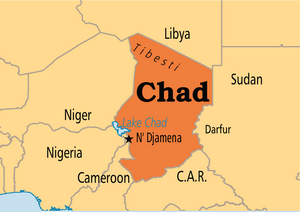Travel banWhy would the Trump administration ban travel from Chad?
To the surprise of many experts, the Trump administration’s revised travel ban removed Sudan – but added Chad, a Muslim majority country in the Sahel region of Africa. Chad’s inclusion has befuddled observers as well as the Chadian government and the African Union. Based on my experience working at the State Department, including a period of time when I was focused on the Sahel, I went looking for reasons that would lead the U.S. to ban Chadians. I found more questions than I was able to answer. Sanctioning a country that has been an ally to the United States on its top national security priority – terrorism – does serve as a red flag to other countries. Some countries will seek to stay on the United States’ good side. Others, especially in Africa, may eye China as an alternative, more reliable partner.

Location of Chad // Source: yahoo.com
In September, the Trump administration issued a revised travel ban after conducting a “worldwide review” to determine whether citizens from other countries posed a security or safety threat.
The administration continued to ban citizens from most of the Muslim majority countries sanctioned in the original order – Somalia, Libya, Yemen, Syria, and Iran. It removed Sudan, even though that country is on the U.S. state sponsor of terrorism list. It added two longtime U.S. adversaries, North Korea and Venezuela, in an apparent attempt to blunt criticisms that the order is a “Muslim ban.”
Surprisingly, the proclamation also added Chad, a Muslim majority country in the Sahel region of Africa. The Sahel is immediately south of the Sahara Desert and stretches east-west across the African continent.
Chad’s inclusion has befuddled observers as well as the Chadian government and the African Union.
Based on my experience working at the State Department, including a period of time when I was focused on the Sahel, I went looking for reasons that would lead the U.S. to ban Chadians.
I found more questions than I was able to answer.
Information sharing problems?
The first accusation levied against Chad is that it “does not adequately share public-safety and terrorism-related information.” To test this claim, I searched for references to this alleged shortfall in U.S. government public documents on Chad’s counterterrorism performance, including in the past ten years of the State Department’s annual Country Reports on Terrorism, Congressional Research Service reports and relevant congressional testimony. I didn’t find references to such shortcomings in the public record.
However, I did find the State Department cable sent to embassies asking for input on governments’ performance for the review. It listed five requirements:
· share biographic and biometricdata on known or suspected terrorists
· provide identities of foreign terrorist fighters
· share arrests and convictions information
· release information on travelers
· issue The International Police Organization, or INTERPOL, notifications. These are alerts sent to other countries on wanted terrorists and felons.
So, is there any evidence Chad failed to meet one or more of these requirements?
In terms of the first one, the Chadian government adopted the U.S.-provided biometric screening system in 2013, so it would be surprising if it refused to share biometric or biographic information on suspected terrorists.
